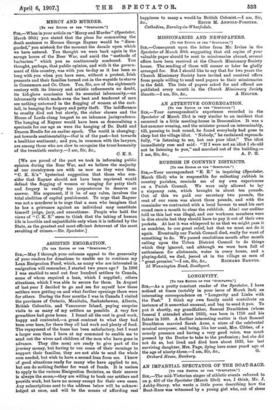MERCY AND MURDER. [TO TER EDITOR or TR) "SesoT.T00."] Srn,—When
in your article on" Mercy and Murder" (Spectator, March 30th) you stated that the pleas for commuting the death sentence re Horace George Rayner would be " disre- garded," you mistook for the moment the decade upon which we have entered. You thought we were back again in the savage hours of the Boer War, and amid the " methods of barbarism" which you so continuously condoned. You thought., perhaps, that public opinion, and with it the govern- ment of this country, was with you to-day as it has been so long with you when you have seen, without a protest, Irish peasants and their families turned out in the wayside to starve in Connemara and Co. Clare. You, Sir, are of the eighteenth century with its literary and artistic refinements no doubt, its kid-glove courtesies but its essential inhumanity,—an inhumanity which made even the best and tenderest of men see nothing untoward in the flogging of women at the cart- tail, in hanging for forgery and petty theft. The indifference to cruelty died out but slowly, the richer classes and the House of Lords clung longest to an inhuman jurisprudence. The banging of Rayner would have been as demoralising a spectacle for our age as were the hanging of Dr. Dodd and Deacon Brodie for an earlier epoch. The world is changing not towards sentimentality—that is of the past—but towards a healthier sentiment; and you, in common with the lawyers, are among those who are slow to recognise the truerbumanity of the twentieth century.—I am, Sir, &c.,
C. K. S.
[We are proud of the part we took in informing public opinion during the Boer War, and we believe the majority of our countrymen are with us now as they were then. "0. K. S.'s " hysterical suggestion that those who con- sider that Rayner should not have been reprieved would defend the flogging of women or banging for petty theft and forgery is really too preposterous to deserve an answer. His argument, if it be of any value, involves the total abolition of capital punishment. To urge that Rayner was not a murderer is to urge that a man who imagines that he has a grievance against an individual may constitute himself judge, jury, and executioner. People who hold the views of " C. K. S." seem to think that the taking of human life is horrible and unjustifiable only when it is inflicted by the State, as the greatest and most efficient deterrent of the most revolting of crimes.—En. Spectator.]










































 Previous page
Previous page